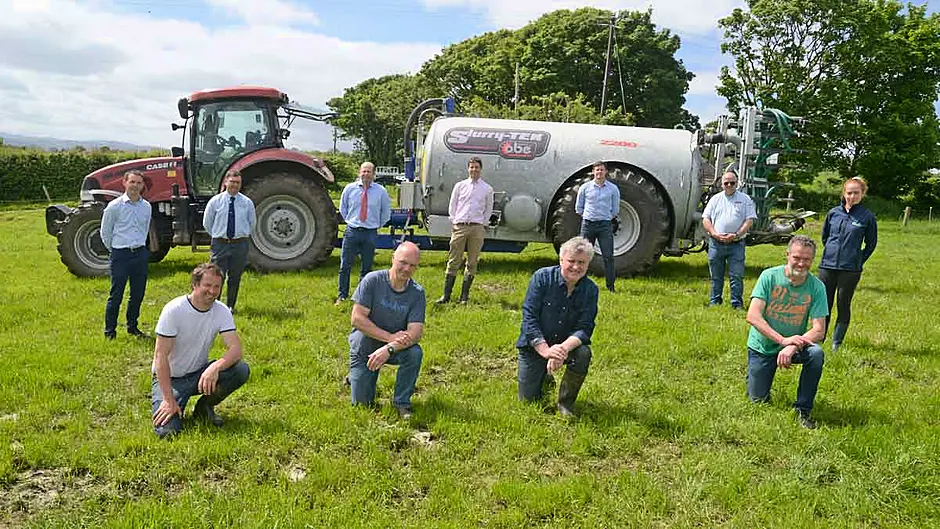A group of pioneering West Cork dairy farmers have set up the country’s first farm machinery sharing co-operative and its first buy was a low emissions slurry tanker
KILNAMARTYRA’s entrepreneurial dairy farmers have set up a unique farm machinery sharing co-operative – and it’s the first one in Ireland.
And now Teagasc say there’s nothing to stop other groups of like-minded farmers replicating the business model so they also can reap the significant financial benefits it delivers.
The germ for what’s called ‘Comharcumann Gleann an Laoi’ started some years back when one of the founding members Brendan Hinchion, had a French student working with him one summer.
The student’s parents came to visit and a conversation ensued how up to 50% of all French farmers are members of machinery co-operatives, known as CUMA (Cooperatives d’Utilisation de Matériel Agricole). An invitation was extended to see a CUMA for themselves, which Brendan and his local discussion group accepted, and they were most impressed with what it delivered for farmers in North West France.
Separately, Thomas Curran (Teagasc’s regional manager in West Cork) in his previous role as farm business structures specialist with Teagasc undertook a study trip to France to learn about how to set up and operate a machinery co-operative in practice.
On his return, Thomas made contact with the Kilnamartyra group and they worked together to set up the co-operative.
In November 2018, Comharcumann Gleann an Laoi was registered with the Friendly Societies Register for co-operatives which is maintained by the Companies Registration Office (CRO).
Members are Brendan along with Colm Kelleher, Patrick McSweeney, John Wood, Pat Cronin, Niall Lucey and Diarmuid Lucey.
‘The main objective of a machinery co-operative is to provide machinery and make it available to co-operative members at a lower cost than buying machinery individually. Therefore, it operates as a non-profit/breakeven entity. The co-operative model can also be used to share labour across members’ farms at busy times of the year. There is great flexibility in the structure in the members have the freedom to invest only in a machine project that they have a need for on their farm,’ said Thomas.
The co-op made its first purchase four months ago – a low emissions slurry tanker.
The cost of €45,000 was covered through: 20% investment from some members, 40% grant from the Department of Agriculture, and the remainder borrowed from Bank of Ireland in Macroom.
There’s a daily charge of €100 for use of the slurry spreader which provides income to the co-op to pay the loan and cover other admin costs. That charge may be slightly higher if a member hasn’t provided any capital towards the purchase.
Interestingly, following lobbying by the members, the Department have now included registered machinery co-operatives under TAMS II as eligible applicants for LESS equipment and for various machines under the tillage scheme. Until now it was only available to individuals.
Oliver Molloy from the Department of Agriculture said they were pleased to be able to provide support to the Cumann Gleann an Laoi co-operative. ‘Initiatives like this machinery co-operative can provide an important framework to help support collaborative farming structures. We would like to acknowledge the work and effort that the co-op members and Teagasc have committed to establishing the co-operative and hopefully it will provide inspiration for others to do likewise.’
The Irish co-operative Society (ICOS) have created a rule book specially tailored to the needs of machinery co-operatives.
At the launch Darragh Walshe from ICOS said: ‘The co-operative model in Ireland has experienced significant success in the agricultural sector and ICOS is constantly exploring ways in which the model can serve farmers.
‘This work has become increasingly relevant amid the challenge of climate change and the co-operative model offers the agricultural sector the opportunity to meet a challenge such as climate change and maintain sustainable, self-sufficient livelihoods. Self-sufficiency and sustainability are at the heart of co-operative values and Comharcumann Gleann a Laoi machinery co-operative delivers on both of these metrics. This is a superb demonstration of the co-operative model’s capacity to provide solutions in a broad range of areas throughout the agriculture sector and beyond.’
Brendan said everything was working out very well so far, and they were pleased to be in a position to buy a much higher spec spreader then they’d otherwise have been able.
‘We’ve a WhatsApp group set up and it’s going fine. It just makes sense not to have lots of money tied up. We’ll review at the end of the year but future purchases would be things like a post driver or bale trailer,’ he said.
Thomas said he hoped the model could be replicated by other discussion groups, where there was an existing level of trust and understanding.








